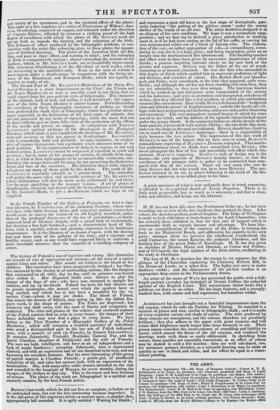The history of Poland is one of injustice and wrong.
Her chronicles are records of acts of oppression and tyranny—of the wars of a nation against kings and rulers. Her annals are written in the blood of her children. Her territories have been progressively abridged ; her liberties narrowed by the closing in of surrounding nations, like the dungeon that contracted on all sides, day by day, until its prisoner was buried alive within it Her disparted limbs were thrown to glut the hunger of the dogs of war; who have now returned to mangle her remains, and lap up the blood. Poland has been the bait thrown out to greedy sovereigns—the morsel over which the spoilers have so long snarled, and which has at last been a mouthful for the voracious Czar—whom it may yet choke. The blood of Poland, that waters the deserts of Siberia, may spring up, like the fabled dragon's teeth, in the shape of armies. The Poles are dispersed; but wherever one shall come, will the seed of liberty and vengeance be scattered. The cries and groans of the widows and enslaved orphans of the Polish patriots find an echo in every breast : the images of their brave defenders may now find a place in every heart. We have before us the First Number of a Biographic Gallery of the Polish Revolution ; which will comprise a hundred portraits of individuals who acted a distinguished part in the last war of Polish independence, with a memoir of each (in French), by Jour% STRASZEWICZ. It contains Jukasinski, Uminski, Brelinski, General Pac, and the heroic Claudine, daughter of Dzialynski and the wife of Potocki. . The men are bold, intelligent, and have an air of independence and a look of manly frankness ; excepting Jukasinski, who is represented chained, and with an expression and air too theatrical to be true, and not becoming his excellent features. But the most interesting of this group of patriot martyrs is Claudine Potocki ; a gentle girl, of unaffected simplicity of air, and calm but earnest look, with an expression of de-termination. She, with many other noble women, attended on the sick and wounded in the hospitals of Warsaw, for seven months, during the ravages of the cholera in that city. This is the truest and best heroism of woman. The plates of the work are lithographed in a spirited and Jnasterly manner,. by the best French artists.


























 Previous page
Previous page